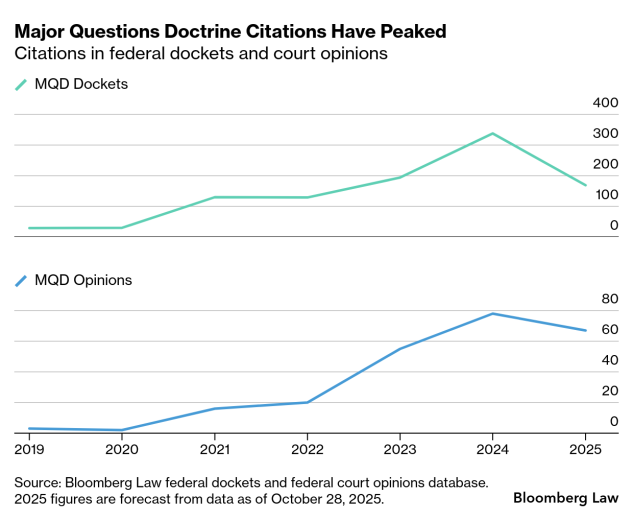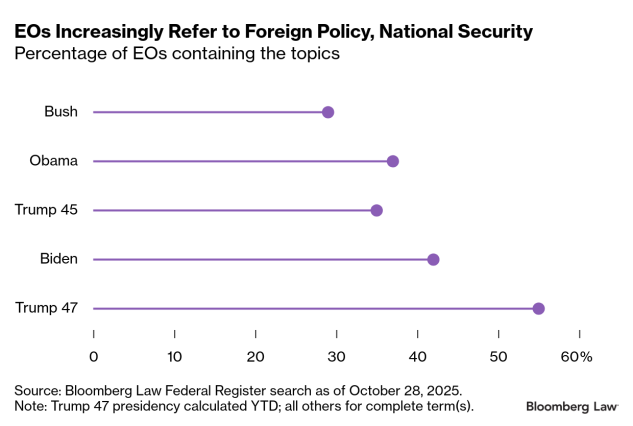The Bloomberg Law 2026 series previews the themes and topics that our legal analysts will be watching closely in 2026. Our Executive Orders & Authority analyses explore the most consequential changes in federal oversight and where they will lead lawyers in the year ahead. Non-subscribers can access the articles in the series here.
The major questions doctrine’s heyday is past. Due to the executive branch’s increasing reliance on foreign policy and national security powers as rationales for action, and the emerging view that those topics are immune from major questions scrutiny, the doctrine is likely to fade into the background for at least the next several years.
The doctrine states that in cases of “vast economic or political significance,” the executive branch must show “clear congressional authorization” for any action it takes that’s “unheralded” and “transformative"—i.e., not the subject of previous exercises of power under the relevant statute.
If it can’t do so, the action’s subject to overturn by the courts. While the doctrine has been recently popular, it’s falling out of favor and will continue to do so over the next year.
Major Questions Citations Are Down
Major questions doctrine citations in federal court filings and in court decisions had climbed every year since 2020, peaking in 2024.
Yet 2025 is on track to have fewer court filings and opinions citations than last year, and this downturn will likely continue next year, based on executive policy and hints in jurisprudence.
Does the Doctrine Apply in International Contexts?
A US Supreme Court concurrence from late last term sheds light on what could be a new limitation on the major questions doctrine. In FCC v. Consumers Research, Justice Brett Kavanaugh said that the major questions doctrine doesn’t apply to foreign policy or national security questions. The doctrine doesn’t “translate to those contexts because of the nature of Presidential decisionmaking in response to ever-changing national security threats and diplomatic challenges,” Kavanaugh said.
Foreign policy and national security fall under what’s known as the “Youngstown category 2” presidential power, Kavanaugh said. This means that they’re independent constitutional powers that don’t rely on delegation from Congress by statute.
When these powers are at play, the usual major questions presumptions are flipped, Kavanaugh said. Courts should assume that Congress intends to give the president “substantial authority and flexibility” to protect Americans, and that Congress must specify any limits on the powers, he said.
Fifth Circuit Judge Andrew Oldham cited Kavanaugh’s concurrence in his dissent in W.M.M. v. Trump, a Fifth Circuit case challenging President Donald Trump’s declaration of an enemy incursion under the Alien Enemies Act. Courts “have afforded the President extensive deference in making fact-intensive determinations involving sensitive issues of national security,” Oldham said.
The majority decision in W.M.M. v. Trump, which upheld the district court’s preliminary injunction on the ground that Trump hadn’t sufficiently identified an “invasion” or “predatory incursion” under the AEA for purposes of deporting Venezuelan nationals, was vacated on Sept. 30 in anticipation of rehearing en banc, currently scheduled for January. It remains to be seen whether Kavanaugh’s view will have greater influence on rehearing.
While Kavanaugh’s concurring opinion isn’t binding law, it may be an important portent of precedent to come—as Justice Neil Gorsuch’s dissent in Gundy, his concurrence in NFIB, and the per curiam opinion in Alabama Association of Realtors foreshadowed the court’s embrace of the major questions doctrine in West Virginia v. EPA.
Are Tariffs Foreign Policy?
The Federal Circuit, however, recently took a different view of whether foreign policy or national security makes an executive decision immune to a major questions challenge. In V.O.S. Selections v. Trump, that court heard an appeal of a Court of International Trade ruling that five Trump executive orders exceeded his tariff powers under the International Emergency Economic Powers Act. In its opinion, the Federal Circuit said that the power asserted in the executive orders had run afoul of the doctrine.
The court found that the tariffs power question was one of “vast economic and political significance” and that the tariffs at issue implicated the doctrine because they were both “unheralded” and “transformative.” Finding no clear congressional authorization for the tariffs, the court upheld the lower court’s summary judgment ruling. In a footnote, the Federal Circuit joined three fellow circuits in holding that the president isn’t exempt from a major questions inquiry. The only circuit to hold that he is exempt, the Ninth, did so in a decision that’s now in question.
The dissent cited Kavanaugh’s concurrence in FCC.
Because it’s the home for many executive action challenges, the Federal Circuit’s ruling could hold a lot of sway. It may also point to future splits between the appeal court’s view and those that side with Kavanaugh’s concurrence.
Trump’s EOs Reference Potentially Exempt Ground
The majority of Trump’s executive orders so far this year refer to foreign policy or national security—a first for any president’s executive orders in the past 25 years.
Trump’s second term is, of course, only beginning. But as of Oct. 28, he’s issued 213 executive orders—a generous sample size. That’s more than President Joe Biden issued during his entire four-year term (170). Trump’s current nine-month executive order count hasn’t yet passed his own four-year total from his first term (383); President Barack Obama’s eight-year total of 289; or President George Bush’s eight-year total of 300, but it’s certainly on track to do so.
Citations to the major questions doctrine are noticeably down. If Trump continues to lean on foreign policy and national security as justifications for his executive orders, it could give courts a reason to shun major questions doctrine challenges to his executive orders and to the agency actions that carry them out. Additionally, Justice Kavanaugh thinks that courts should decline to apply the doctrine in those contexts. It’s possible that additional justices will join him in the near future. All these factors will contribute to sidelining major questions arguments in the coming year.
Access additional analyses from our Bloomberg Law 2026 series here, covering trends in Litigation, Corporations & Transactions, Executive Orders & Authority, and Artificial Intelligence.
Bloomberg Law subscribers can find related content on our In Focus: Executive Orders & Actions resource and our In Focus: Chevron, Loper & Agency Deference page, including Practical Guidance on the major questions doctrine.
If you’re reading this on the Bloomberg Terminal, please run BLAW OUT <GO> in order to access the hyperlinked content, or click here to view the web version of this article.
To contact the analyst on this story:
To contact the editor responsible for this story:
Learn more about Bloomberg Law or Log In to keep reading:
See Breaking News in Context
Bloomberg Law provides trusted coverage of current events enhanced with legal analysis.
Already a subscriber?
Log in to keep reading or access research tools and resources.


